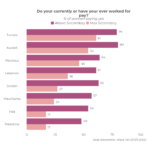As China reemerged as a major actor in the Middle East and North Africa over the past decade, particularly through its Belt and Road Initiative, Arab publics initially held very favorable attitudes toward the world power. Yet as this relationship deepened and the scope of engagement became clearer, positive views of China began to fall.
That trend has reversed over the past 14 months, however, as support for China dramatically improved in the wake of the events that followed October 7, 2023. Less an outcome of what China has done to improve its image, the change is largely a result of souring views of the U.S. that have led Arab publics to turn toward a Chinese alternative.
When Israel began its military campaign in Gaza following Hamas’ October 7 attacks, President Joe Biden pledged “ironclad” support for Israel. As bombs started to fall on Gaza, the views of MENA citizens shifted against the U.S. By chance, Arab Barometer was fielding a survey in Tunisia in the three weeks before October 7 and the three weeks that followed. Prior to that day, U.S. favorability in Tunisia stood at 40%; by October 27, it plummeted to just 10%. At the time, Tunisian views of China were relatively static.
Surveys conducted in the months that followed confirmed this drop in favorable opinion of the U.S., where in Jordan, Mauritania, Lebanon and Iraq favorability fell between 23 and 7 points compared with surveys completed before October 7. Meanwhile, China’s favorability increased in all those countries, with the exception of Mauritania, rising between 6 and 16 points.
The survey results make clear that the sudden increase in China’s favorability is unlikely to be a result of its response to the Gaza conflict. In the surveys following October 7, Arab Barometer included a question that asked respondents to name the country (or countries) they thought most committed to defending Israeli rights and to defending Palestinian rights. Majorities of at least 60% in all countries where this question was asked said the U.S. was committed to defending Israeli rights. For China, at most 14% said it was committed to defending Palestinian rights, while no more than 13% said it was committed to defending Israeli rights. Thus, the U.S. has been perceived as extremely one-sided in this conflict while China is effectively seen as peripheral.
Given that views of China had been declining between 2019 and 2022, it is clear that the sudden increase in support for China is the result of China being the primary rival to the U.S. Or, put another way, Arab publics are following the logic of “the enemy of my enemy is my friend.”
As China seeks to make inroads across MENA, citizens in the region will be more welcoming than before. And, despite the prevalence of authoritarian regimes in the region, the views of Arab publics are relevant for this global competition. Many leaders are likely to see this as an opportunity to not only increase foreign investment from China, but also to placate the demands of their citizens on this front. For example, the recent state visit of President Xi Jinping to Morocco, a long-time U.S. ally, was the first ever visit by a Chinese leader and comes amid deepening ties between China and Morocco. Beijing is benefitting from public sentiment across the region and will seek to take advantage of this opportunity as part of its global competition with Washington.
Read original post at the Middle East Council on Global Affairs


